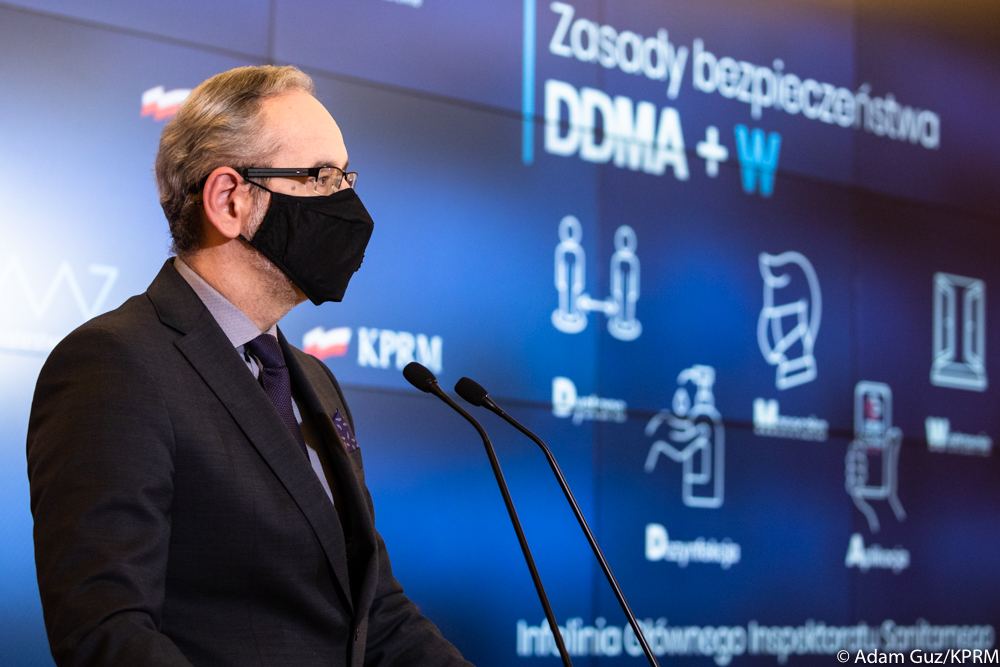Poland’s health minister has again defended his government’s decision not to introduce restrictions in response to a rapid rise in coronavirus infections. He claims that they are “not a very effective means of limiting the pandemic”.
For the second day in a row, Poland today recorded over 28,000 new COVID-19 cases. The number of Covid-related deaths, 497, was the most since early May. Both infections and deaths have been rising rapidly since early October.
But the government has insisted that new restrictions are not necessary, and could even be counterproductive due to the “social costs” they cause and the fact that they could provoke protests. Poland is the only EU member state other than Finland not to introduce restrictions for unvaccinated people, reports Gazeta Wyborcza.
In an interview today with RMF FM, health minister Adam Niedzielski took the argument against restrictions even further, claiming that they would have little effect in preventing infections.
“We know at the moment that restrictions are not a very effective means of limiting the growth of the pandemic,” he said. Niedzielski argued that the main purpose of restrictions is to protect the healthcare system but, currently, there are fewer Covid hospitalisations than a year ago.
Just over 19,000 people are hospitalised with Covid in Poland according to today’s health ministry data. On the same day last year, the figure was over 22,000.
🎥Minister zdrowia @a_niedzielski w #RozmowaRMF: Wiemy w tej chwili, że restrykcje są mało skutecznym środkiem zapobiegania pandemii @RMF24pl pic.twitter.com/iHXeoouwGv
— RozmowaRMF (@Rozmowa_RMF) November 25, 2021
Niedzielski said it was “strange” that so many people claim “restrictions are the only way to fight the pandemic”. In fact, “it’s different now because we have vaccinations, we have better organised the healthcare system”, he argued.
Comparing the situation now to that of a year ago – when Poland had introduced a tough lockdown – “it turns out that those restrictions were much less effective in reducing hospitalisation than vaccination”, claimed the minister.
Niedzielski, who was appointed to his post in August 2020, oversaw the introduction and enforcement of that lockdown last autumn, as well as another in early 2021. At that time he called restrictions a “very important” tool in fighting the pandemic and introduced what he called a “zero tolerance” approach to enforcing them.
In his interview today, Niedzielski noted that “we now have close to 60% of the population vaccinated” (the proportion of people fully vaccinated in Poland is 54%). When non-vaccinated people with antibodies are included, that reaches 70-75%, providing strong “population immunity”, he added.
The minister said that, in the future, “higher level of immunisation of children would certainly limit the transmission mechanism” because schools have been the site of many recent major outbreaks of the virus.
The government’s decision not to introduce restrictions has drawn criticism from some quarters, including the largest opposition parties. Donald Tusk yesterday accused the authorities of “abdicating” the fight against the pandemic, which he said would result in the deaths of many Poles.
Main image credit: Adam Guz/KPRM (under CC BY-NC-ND 2.0)

Daniel Tilles is editor-in-chief of Notes from Poland. He has written on Polish affairs for a wide range of publications, including Foreign Policy, POLITICO Europe, EUobserver and Dziennik Gazeta Prawna.




















